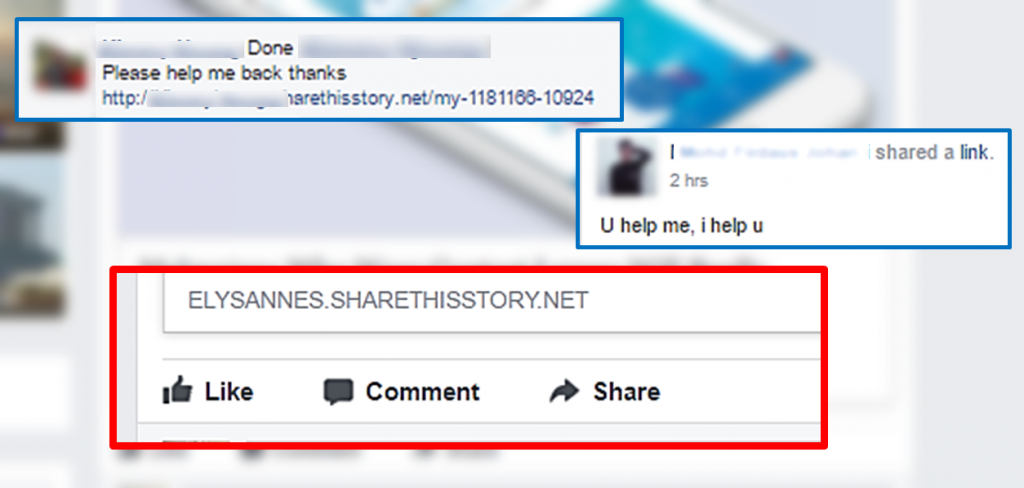The first time I came across one of these sites was on a job searching group on Facebook.
I found a post that promised that I could earn money from the comforts of my own home. As a student longing for an iPhone 6 at the time, I left a “PM” on the comments on that post.
And that PM came.
The PM linked me to one of these incentive sharing sites. In that link, the poster also included her own promo code and encouraged me to key that in to give her some extra cash.
Here, I was introduced to this new brand of marketing: incentivising individuals to share content instead of relying on large advertising corporations.
Is It A Scam?
That was my first thought upon being presented with this concept.
However, if your concern was about payment, then no, it’s not a scam. If you use the “legitimate” sites, you will get your payment (under certain conditions, of course).
A popular iteration of this is sharing a link on your social media page for cash. You share a unique link and the more people who visit the site from your share, the more money you get.
Even a cursory Google search will reveal an absolute plethora of these sites; Spaste, VisitsToMoney, and SharePop (if you have a minimum 10,000 followers). Or if you’re loyal to Malaysian brands, then 8Share and Skribble.me have got you covered, among others.
So I Gave It A Shot

The follower-count on my long-abandoned Twitter account is abysmal, but I tried it out for a while. Unfortunately, since I’m basically using a zombie Twitter account to do this, I earned precisely zero dollar bills from this exercise.
I turned to my frequently-used Facebook account and even shared it on a few groups, which earned me some unique clicks. Not enough to cash out based on the minimum of RM10 rule for the first month on 8Share, the site I tried out.

So, if you see your friends sharing links with ‘sharethisstory.net’ or similar names in the URL, it’s most likely not a hack or virus.
This was an issue I faced when I tried to get my friends to click on the link. Too many of them were convinced that I was sending them some sort of Ransomware.
After trying out the normal methods, I began cruising online for other options and discovered 8Share Facebook Pages.

It seemed easy. A click for a click.
I’ll send a screenshot that I clicked, and they’ll send a screenshot that they did. Everybody earns together.
Except not.
For one thing, such an easily exploitable method should already be on 8Share’s radar. And based on this explanation by an 8Share blog, most of the clicks that I would be getting in these groups mean nothing.
This is because 8Share counts unique clicks to the site itself, and not on the individual post.
So if today, I helped Person A by going on his link, I can’t then ‘help’ Person B out by clicking on their link, because my click isn’t unique anymore.
Going in incognito mode doesn’t always yield a “click”, which makes sense. If they didn’t have this in place, then I could just go into incognito mode and keep clicking on my own link forever.
Even though at least a dozen people proved to me that they clicked on my link, I only earned a grand total of RM0.40 from trying this method.
How The Big-Earners Are Doing It
One dude on YouTube is apparently earning RM480 a week from it. I guess he can quit his day-job, unlike me.
How he does it specifically is to directly message his friends, one-by-one, requesting that they click on the links. And with a copy-paste link, you can definitely do it.
It’s the social media equivalent of cold-calling.
It should be noted that according to 8Share’s Code of Honour, this can be considered a dubious method. If you’re found sharing the links on sites other than the recognised social media platforms, you could be barred from your earnings that month.
Also, forego the tips and tricks.
One of the upsides of sites like 8share is that they give you an option to share whatever ‘Special’ you’d like. So if you see something that you’d share on Facebook anyway, that’s something that can go up on your social media pages without seeming obvious that you’ve “sold out”.
We’ve seen some people hide ‘sharethisstory’ name in the URL with a bit.ly link, so that your friends are less mistrustful of your shares (and help you track earnings owed in real-time).
But other than that, it’s all down to strategic sharing, like sharing to groups that enjoy similar content.
And once you earn the minimum RM50, it’s all down to filling in your information. You can click on the “Cash Out” button on your 8Share dashboard and fill in a form. The money will come in 20–30 days, after they checked that you pass the Code of Honour.
If you see similar URLs in your social media feeds in the future, at the very least you’ll know why now.
Okay, but this all still seems pretty dubious.
And that’s fair observation. The users are appearing to share something organically on their social media pages, but are actually getting paid per click. Most of the individuals clicking on these links who are unaware that they’re giving away their click for 20 cents (more or less) to the sharer.
One concern that some may have about these posts is that they’re not clearly labeled as #spon or #promotion.
The sharing is supposed to look as “genuine” as possible. This in itself is a major issue under discussion when it comes to social media sharing.
In fact, just recently, a huge debacle known as the Fyre Festival raised international concerns around how even influencers need to start tagging their paid-for, sponsored content as sponsored.
Essentially, influencers and celebrities were paid to endorse this event and promote it on their social media feeds. However, most did not indicate that they were paid to talk about the event, which turned out to be a mess and had to ultimately be cancelled.
That’s for the users. Brand owners and advertisers have their own concerns when it comes to platforms like these.
Advertisers and investors to a certain website or platform may see higher amount of clicks and shares thanks to these link-sharing sites. But, based on some of the methods people use in order to drive up their clicks and earn money, these clicks will not convert into heightened brand awareness or purchases. Empty clicks, basically.
Some might see these as just a step away from clickfarms, which are services that can be bought to artificially boost clients’ websites and products. Clickfarms can be used to inflate social media engagement and website views, which give a false impression of the value of a site.
All in all, while incentive-sharing sites might be a good way for users to get some petty cash and for content creators to get their names out there, you might need to approach joining this with a grain of salt. But if you only get one thing out of this article, at least today you’ll know what the URLs to incentive-sharing posts look like.
Now you can decide whether you’d like to contribute a click to the sharer or not.














